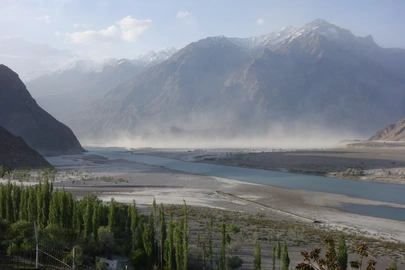Farmer-managed irrigation in Tajikistan, India, Pakistan and Kyrgyzstan
April 24, 2014.
This research looks at farmer-managed irrigation in the high altitude mountain valleys of the Kyrgyz Alai, the Tajik Pamir, the Pakistani Karakorum, and the Indian trans-Himalaya. It is part of the BMBF-funded research program Crossroads Asia.
Farmer-managed irrigation systems
This study asks how farmer-managed irrigation systems across the region have, over time, been differentially transformed - due to government and non-governmental processes. It also asks how levels of equality and inequality between and among water-users have been affected by these changes. Field research has been conducted in four mountain sites in Kyrgyzstan (Osh province), Tajikistan (Gorno-Badakhshan), Pakistan (Baltistan) and India (Ladakh’s Kargil), including in-depth studies of irrigation channels and villages. Similarities in irrigation practices are found across the region, but there are also differences in the types of interventions taking place and in emergent inequalities in access to and control over water.
Causes and impact
Migration, changing values and demographics impact the way farmers manage irrigation systems. The effect is most pronounced in the former Soviet regions (Alai, Pamir) because of the rapid decline in government funding and high levels of out-migration in the past two decades. These effects are also tied to political developments within the respective regions, which largely determine how water-users or village-based leaders try to gain funds to renovate irrigation systems. The political context also determines how much attention a government pays to its mountain villages, which non-governmental organizations (NGOs) are present in a region, and the approaches both government and NGOs take to development interventions, e.g. top-down engineer-led approaches, or bottom-up participatory approaches.
Inequalities
Perceptions of inequalities in access to and control over water vary according the position of the actor, whether it be a woman or man, large or small landholder, well-to-do or poor household, an NGO or government official, and according to the cultural, religious and historical context (e.g. Soviet, Pakistani). The recording and interpretation of such perceptions is mediated by the researcher’s stance.
Crossroads Asia (<link http: www.crossroads-asia.de external-link-new-window external link in new>www.crossroads-asia.de) is coordinated by ZEF and includes researchers from seven German universities. Crossroads Asia engages with the ongoing debate surrounding the future of area studies and the role of the traditional academic disciplines in the production of knowledge. Under the program empirical research has been undertaken from an actor-centered perspective across the geographical region which straddles Iranian studies, Central Asian studies, South Asian studies, Tibeto-Buddhist studies, Indo-Islamic studies, etc. involving disciplinary (political science, geography, anthropology, sociology, etc.) and interdisciplinary researchers (e.g. development studies).
Author: <link mail window for sending>Joe Hill
You can also read the article in ZEF news no. 29 <link fileadmin webfiles downloads news zef_news_29_2014 zef_news_29_englisch_hill.pdf download file>here.



